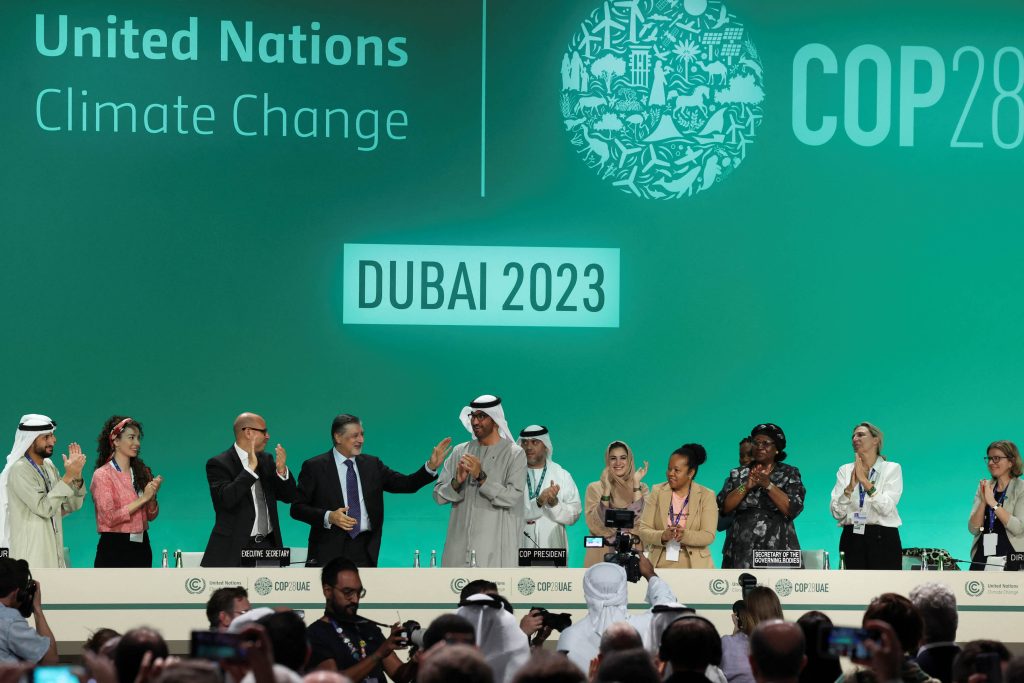The biggest disappointment of the summit was that it ended with the decision to “transition away from fossil fuels,” the main culprit behind climate change, instead of the much-anticipated call for phasing out. by R Dyes

There is nothing more powerful than the forces of nature unleashed in all their fury. If we don’t limit temperature rise to 1.5 degrees C soon, we will be pulling the plug on the planet and ourselves.
Frighteningly, not only is the world off track to tackle climate change, it remains headed for a temperature rise of up to 2.6 degrees C, said the first comprehensive UN Global Stocktake of efforts to limit warming that was released a few months ago in the run-up to the COP28 summit at Dubai, UAE in Nov-Dec 2023.
With the planet already feeling the effects of climate change, one had hoped that the world leaders, particularly those belonging to the climate-vulnerable nations, who had gathered for the COP28 summit would push for some concrete, pathbreaking changes and there would be some straight-talking that would make the leaders belonging to the major polluting countries realise that unless drastic decisions are taken to cut emissions, we are hurtling towards our destruction as global temperatures continue to rise.
There were, however, a few wins, like agriculture-intensive nations inking the Declaration on Sustainable Agriculture, Resilient Food Systems, and Climate Action and committing to integrate food and food systems into their Nationally Determined Contributions (NDCs) by 2025. This was a big victory because it was the first time that talks on sustainable food production became part of the agenda.
The second big takeaway was the flurry of positive and vital steps on forests, ranging from enhanced commitments to ending deforestation in the tropics to new financial support for forest action in developing countries.
But, the COP28 left some loose ends to be tied up next year at the COP29 summit in Azerbaijan.
Though the COP28 began on a positive note, with the Loss and Damage Fund that is meant to help climate-vulnerable countries deal with the major effects of climate change, being effectuated on the first day itself, developing nations who are the most climate-vulnerable, had to make major compromises to seal the deal.
Plus, the $700 million pledged for the Loss and Damage Fund is nowhere near the projected $580 billion in climate change-related damages that vulnerable countries will incur by 2030.
Also, while Loss and Damage were made a part of the Global Stocktake decision it was not given the status of the third arm in the fight against climate change along with adaptation and mitigation, which was an oversight and does not bode well for developing countries. .
Going forward, the Loss and Damage Fund Board must ensure that the fund is up and running by COP29; its policies are flexible and it mobilizes adequate funds and resources for those who need it.
Also, in order to meet the projected $580 billion climate change-related damages, developed nations who are the biggest contributors to global warming in the first place, must pledge more sizeable funds to help climate-vulnerable countries more effectively rather than providing a mere lip service.
They must also apportion generous funds for the all-important Santiago Network that is meant to mobilise the technical know-how for the adoption of technologies and approaches for averting, minimizing, and addressing Loss and Damage at the local, national and regional levels.
The biggest disappointment of the COP28 was that it ended with the decision to “transition away from fossil fuels” , the main culprit behind climate change, instead of the much-anticipated call for phasing out.
The UAE Consensus called for the world to “transition away from fossil fuels in energy systems, in a just, orderly and equitable manner, accelerating action in this critical decade, to achieve net zero by 2050.”
The UAE Consensus also included the pact to triple the world’s renewable energy capacity and double its energy efficiency by 2030. It called on nations to speed up the reduction in emissions from road transport with the aid of EVs, RRTS, electric public transport, and a safe cycling infrastructure wherever possible.
Even though some see it as a big win because this was the first time the term even appeared in a COP’s formal outcome the scientific community is seething over it as too late and too little.
Climate scientists say the failure to phase out fossil fuels runs counter to the key goal of limiting global warming to 1.5C. They say that the only viable path forward is for every nation, developed or otherwise, to phase out almost all fossil fuels as quickly as possible.
Sir David King, Chair, of Climate Crisis Advisory Group and UK’s former Chief Scientific Adviser summed it up, “The wording of the deal is feeble. Ensuring 1.5C remains viable will require total commitment to a range of far-reaching measures, including full fossil fuel phase-out. There was a chasm between the stark statement of the emissions cuts needed and the action proposed to deliver those reductions. The COP28 text recognises there is a need for deep, rapid, and sustained reductions in greenhouse gas emissions to stay in line with 1.5C. But then it lists a whole bunch of efforts that don’t have a chance of achieving that.”
The other major disappointment was the charter that was released by the UAE and Saudi Arabia that committed oil companies to reach net-zero emissions by 2050 for their operations but not for the fuel they sell.
This oversight is significant because oil sale accounts for up to 95 per cent of the petroleum industry’s contribution to global warming.
For the world to meet its climate goals, governments must ensure that the oil and gas sector addresses its operations and the products it sells to the whole world.
We can’t just “transition away” from fossil fuels if we are serious about saving the planet. We have to phase out fossil fuels as fast as we can. And it is not the public who can do this, it is the policymakers i.e the governments and our leaders who will have to ensure that the UAE Consensus is translated into laws, domestic policies and NDCs.
They could not push for phasing out at the COP28 but now that they are back in their domains, our leaders and governments need to make phasing out a big part of national policies and give a major push to green energy, green transport, and reduce the use of fossil fuels drastically.
For this, the politicians will have to bite the bullet no matter how unpopular their decisions might be with the public and even the fossil fuel lobby which is extremely strong globally.
Also, while renewable energy is the cheapest option in the long run, getting it up and running in the beginning requires a lot of investment which puts wind and solar power out of reach of developing countries.
The COP28 outcome did not tackle these financial challenges but it must do so at the next UN climate summit.
On their own, developing nations can ramp up renewable energy use for their citizens by providing subsidies and also encouraging local manufacturing of parts so that the cost comes down for the end user. This will also have the dual impact of reducing heating greenhouse gases and generating much-needed employment.
At the end of the day, we are all equal participants and owners of this planet. While agreements at global fora can show the right path, the planet’s fate and ultimately ours will be decided by how well nations play their part in tackling the climate crisis.













